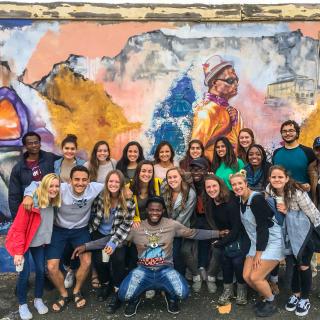Lead with Curiosity
While there may be aspects of your host city that are familiar to wherever you call home, it’s likely there will be differences as well. This is an opportunity to really lean into the fact that learning during this term, happens in more than just the classroom.
Take the observations you’ll make, for example. As an American, you might be asked a question about your culture that feels surprising. Or maybe you’ll notice a habit that locals do, that would be seen as confusing back home.
Sometimes our human reaction is to be defensive in response to uncomfortable questions or to be judgmental of a different perspective. In moments like these, lead with curiosity—take a pause and in response to that tricky question, ask “Oh, what makes you think that?”. Or the next time you’re unsure of a common practice that is different than your own, use it to spark a conversation about their culture in the process.
In the same way you’re curious, so are others! In some cultures, casually discussing religion, politics, or other topics viewed as more personal in the States, is the norm. It’s likely that their questions are coming from a place of genuine curiosity, but if it feels otherwise, you don’t have to always push outside of your comfort zone, you can disengage from the conversation.
Understand and Embrace that You're in a New Cultural Context
Study abroad has the potential to expand your perspective and shape you into a global citizen, if you allow it. Let’s start by tackling what you can do before you go. To develop a deeper awareness of your program location, explore cultural events or spaces like museums that can teach you about the rich history of your host country. And if there’s another language spoken, don’t just wait until you’ve arrived to become familiar. Whether it’s watching movies, creating a playlist or using an app there’s several fun ways to build in a habit before takeoff.
As you’re adjusting to a new way of life, remind yourself that this growth is part of what’s transformative about studying abroad. In the U.S. alone, many of us come from different cultural contexts, shaping our views and actions. The same goes for people abroad. Keeping this in mind helps you notice when you're seeing things through your own perspective, and reminds you that others may be doing this too.
Stepping beyond your comfort zone makes you more adaptable. You’re no longer just learning about cultural differences, but how to have conversations across them. Ask yourself what you can learn from where you’re studying or when you experience something different than what you expected, allow yourself to be challenged by it. Even in instances where it forces you to see yourself in a different context. Dig into what it means to be American or traveling outside of the U.S. while studying and living in a new place. Steps like these will help expand your view of the world and how you navigate through it.
Pro Tip: Don't just take our word for it. To hear what a experiencing a new culture is really like, you can dive into our Correspondent blogs. They're first-hand and unfiltered stories from students who have been in your shoes, and can offer peer-to-peer advice. Remember, You Don't Always Have to be the Representative of Where You're From
You and your experiences are unique—there’s no way for you to be an expert on every possible opinion where you’re from!
If you find yourself in a challenging conversation or simply don’t feel like going deep on a specific topic, take a deep breath and share what feels authentic to you. If you’re comfortable you might say something like: “I’ve experienced ‘x’, and I know that it can look different for others.”
It’s also okay to simply say that you’re not sure; we might not always have or know the answer. Everyone has a smartphone these days, maybe you can both learn together! Also, keep in mind that events in the U.S. are being covered globally, but our news cycles might not be covering all of the events about your host country. So, don’t be shocked if people are wanting to discuss what they’re hearing.
In moments where things to start to feel too heavy, we’ve prepped a few responses you can have on-hand:
"That interesting."
"I'm not comfortable chatting about this. Can we talk about something else?"
You can also turn the question back to them: "Hm, I don't know a lot about 'x' in your country. I'd love to hear more on that." Or "I'd love to hear your thoughts on that."
This is also a great way to stand out less, if you don’t want to be seen as “The American” where you go: know that college shirts or clothing that is clearly from the U.S. will be apparent, and the same with speaking very loudly. Also, be culturally competent and aware of where you are geographically rather than filtering everything through the lens of only your experiences. Showing up eager to learn, open, and engaged will go a long way.





